| Listing 1 - 6 of 6 |
Sort by
|
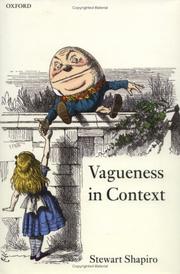
ISBN: 9780199544783 9780199280391 0199280398 0191707163 0199544786 9786610905966 0191535672 1280905964 1435623274 Year: 2006 Publisher: Oxford Clarendon
Abstract | Keywords | Export | Availability | Bookmark
 Loading...
Loading...Choose an application
- Reference Manager
- EndNote
- RefWorks (Direct export to RefWorks)
Stewart Shapiro's ambition in Vagueness in Context is to develop a comprehensive account of the meaning, function, and logic of vague terms in an idealized version of a natural language like English. It is a commonplace that the extensions of vague terms vary according to their context: a person can be tall with respect to male accountants and not tall (even short) with respect to professional basketball players. The key feature of Shapiro's account is that the extensions of vague terms also vary in the course of conversations and that, in some cases, a competent speaker can go either way without sinning against the meaning of the words or the non-linguistic facts. As Shapiro sees it, vagueness is a linguistic phenomenon, due to the kinds of languages that humans speak; but vagueness is also due to the world we find ourselves in, as we try to communicate features of it to each other.
Vagueness (Philosophy) --- Semantics (Philosophy) --- Language and languages --- Philosophy. --- Vague (Philosophie) --- Vagueness (Philosophy). --- Lexicology. Semantics --- Philosophy of language --- Semantics (Philosophy). --- Sémantique (Philosophie) --- Langage et langues --- Philosophie --- Intension (Philosophy) --- Logical semantics --- Semantics (Logic) --- Semeiotics --- Significs --- Syntactics --- Unified science --- Philosophy --- Logic, Symbolic and mathematical --- Logical positivism --- Meaning (Psychology) --- Philosophy, Modern --- Semiotics --- Signs and symbols --- Symbolism --- Analysis (Philosophy) --- Definition (Philosophy) --- Language and languages - Philosophy.
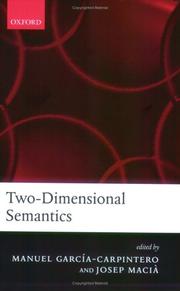
ISBN: 0199272026 9780199272020 019927195X 9780199271955 0191533971 128090562X 1429491809 1383041547 9780191533976 9781280905629 9786610905621 6610905622 9781429491808 Year: 2006 Publisher: Oxford New York Clarendon Press Oxford University Press
Abstract | Keywords | Export | Availability | Bookmark
 Loading...
Loading...Choose an application
- Reference Manager
- EndNote
- RefWorks (Direct export to RefWorks)
Two-dimensional semantics is a framework that helps us better understand some of the most fundamental issues in philosophy: those having to do with the relationship between the meaning of words, the way the world is, and our knowledge of the meaning of words.
Logic --- Theory of knowledge --- Semantics. --- Semantics (Philosophy) --- Sémantique --- Sémantique (Philosophie) --- Intension (Philosophy) --- Logical semantics --- Semantics (Logic) --- Semeiotics --- Significs --- Syntactics --- Unified science --- Language and languages --- Logic, Symbolic and mathematical --- Logical positivism --- Meaning (Psychology) --- Philosophy, Modern --- Semiotics --- Signs and symbols --- Symbolism --- Analysis (Philosophy) --- Definition (Philosophy) --- Formal semantics --- Semasiology --- Semiology (Semantics) --- Comparative linguistics --- Information theory --- Lexicology
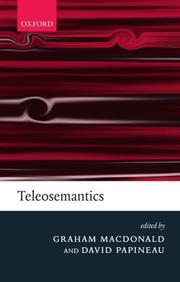
ISBN: 0199270260 0199270279 9780199270262 9780199270279 9786610752454 0191515051 1280752459 1429459387 9781429459389 6610752451 1383041350 Year: 2006 Publisher: Oxford ; New York : Clarendon Press,
Abstract | Keywords | Export | Availability | Bookmark
 Loading...
Loading...Choose an application
- Reference Manager
- EndNote
- RefWorks (Direct export to RefWorks)
'Teleosemantics' seeks to explain meaning and other intentional phenomena in terms of their function in the life of the species. This volume of new essays from a line-up of well-known contributors offers a summary of the current state of the teleosemantics debate.
Mechanism (Philosophy) --- Naturalism --- Semantics (Philosophy) --- Intension (Philosophy) --- Logical semantics --- Semantics (Logic) --- Semeiotics --- Significs --- Syntactics --- Unified science --- Language and languages --- Logic, Symbolic and mathematical --- Logical positivism --- Meaning (Psychology) --- Philosophy, Modern --- Semiotics --- Signs and symbols --- Symbolism --- Analysis (Philosophy) --- Definition (Philosophy) --- Materialism --- Philosophy --- Positivism --- Science --- Mechanistic philosophy --- Philosophy, Mechanistic --- Biology --- Life (Biology) --- Vitalism --- Philosophical anthropology --- Theory of knowledge --- Naturalism.
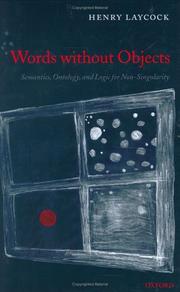
ISBN: 0199281718 9780199281718 0191603597 9786611153915 0191535915 1281153915 1435623886 Year: 2006 Publisher: Oxford Clarendon
Abstract | Keywords | Export | Availability | Bookmark
 Loading...
Loading...Choose an application
- Reference Manager
- EndNote
- RefWorks (Direct export to RefWorks)
Lexicology. Semantics --- Philosophy of language --- Object (Philosophy) --- Ontology. --- Semantics (Philosophy) --- Semantics. --- Substance (Philosophy) --- 800.1 --- Taalfilosofie --- 800.1 Taalfilosofie --- Object (Philosophy). --- Semantics (Philosophy). --- Substance (Philosophy). --- Ontology --- Semantics --- Matter --- Metaphysics --- Reality --- Intension (Philosophy) --- Logical semantics --- Semantics (Logic) --- Semeiotics --- Significs --- Syntactics --- Unified science --- Language and languages --- Logic, Symbolic and mathematical --- Logical positivism --- Meaning (Psychology) --- Philosophy, Modern --- Semiotics --- Signs and symbols --- Symbolism --- Analysis (Philosophy) --- Definition (Philosophy) --- Formal semantics --- Semasiology --- Semiology (Semantics) --- Comparative linguistics --- Information theory --- Lexicology --- Being --- Philosophy --- Necessity (Philosophy)
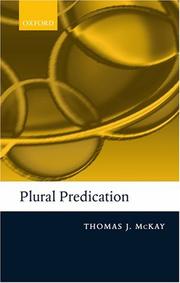
ISBN: 0199278148 9780199278145 019170797X 9786610905904 0191535206 1280905905 1435623460 Year: 2006 Publisher: Oxford Clarendon
Abstract | Keywords | Export | Availability | Bookmark
 Loading...
Loading...Choose an application
- Reference Manager
- EndNote
- RefWorks (Direct export to RefWorks)
Plural predication is a pervasive part of ordinary language. We can say that some people are fifty in number, are surrounding a building, come from many countries, and are classmates. These predicates can be true of some people without being true of any one of them; they are non-distributive predications. However, the apparatus of modern logic does not allow a place for them. Thomas McKay here explores the enrichment of logic with non-distributive plural predication and quantification. His book will be of great interest to philosophers of language, linguists, metaphysicians, and logicians.
Logic --- Lexicology. Semantics --- Grammar --- Philosophy of language --- Grammar, Comparative and general --- Language and languages --- Logic. --- Predicate (Logic) --- Semantics (Philosophy) --- Number. --- Philosophy. --- Predicate (Logic). --- Semantics (Philosophy). --- Intension (Philosophy) --- Logical semantics --- Semantics (Logic) --- Semeiotics --- Significs --- Syntactics --- Unified science --- Logic, Symbolic and mathematical --- Logical positivism --- Meaning (Psychology) --- Philosophy, Modern --- Semiotics --- Signs and symbols --- Symbolism --- Analysis (Philosophy) --- Definition (Philosophy) --- Predicables (Logic) --- Predication (Logic) --- Categories (Philosophy) --- Language and logic --- Argumentation --- Deduction (Logic) --- Deductive logic --- Dialectic (Logic) --- Logic, Deductive --- Intellect --- Philosophy --- Psychology --- Science --- Reasoning --- Thought and thinking --- Dual (Grammar) --- Number (Grammar) --- Plural (Grammar) --- Number --- Methodology --- Linguistics --- Philology
Book
ISBN: 2868202888 9782868202888 Year: 2006 Publisher: Strasbourg: Presses universitaires de Strasbourg,
Abstract | Keywords | Export | Availability | Bookmark
 Loading...
Loading...Choose an application
- Reference Manager
- EndNote
- RefWorks (Direct export to RefWorks)
Semantics (Philosophy) --- Semiotics --- Sense (Philosophy) --- Signs and symbols --- Culture --- Sémantique (Philosophie) --- Sémiotique --- Sensibilité (Philosophie) --- Signes et symboles --- Philosophy --- Semiotic models --- Philosophie --- Modèles sémiotiques --- Semiology --- #SBIB:316.7C120 --- #SBIB:309H505 --- Cultuursociologie: algemene en theoretische werken --- Code en boodschap: psychologische, psycho-analytische benadering --- Sémantique (Philosophie) --- Sémiotique --- Sensibilité (Philosophie) --- Modèles sémiotiques --- Representation, Symbolic --- Semeiotics --- Signs --- Symbolic representation --- Symbols --- Abbreviations --- Omens --- Sign language --- Symbolism --- Visual communication --- Senses and sensation --- Semiology (Linguistics) --- Semantics --- Structuralism (Literary analysis) --- Intension (Philosophy) --- Logical semantics --- Semantics (Logic) --- Significs --- Syntactics --- Unified science --- Language and languages --- Logic, Symbolic and mathematical --- Logical positivism --- Meaning (Psychology) --- Philosophy, Modern --- Analysis (Philosophy) --- Definition (Philosophy) --- Ethnology --- Methodology --- Signs and symbols - Philosophy --- Culture - Semiotic models --- Acqui 2006
| Listing 1 - 6 of 6 |
Sort by
|

 Search
Search Feedback
Feedback About UniCat
About UniCat  Help
Help News
News